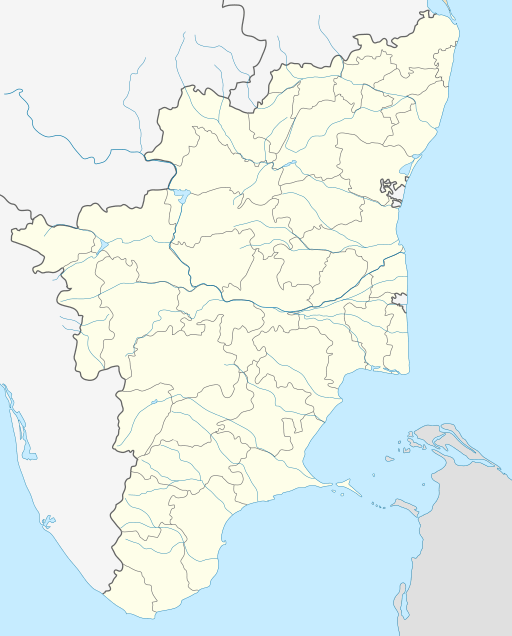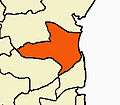Virudhachalam
Virudhachalam or Pazhamalaim is a railway town and taluk headquarters in Cuddalore district in the Indian state of Tamil Nadu. The ancient name of this town is Thirumudhukundram. As of 2011, the town had a population of 73,585. The ancient Lord Siva temple (Pazhamalai Nadhar Temple or Vriddhagiriswarar Temple or Viruthagerreswarar Temple or Viruthagireeswarar temple) is located in the heart of town.[1] This is the 41st Devaram Padal Petra Siva Thiruthalam and 9th Thiruthalam in Nadu Naadu(நடுனாடு).[2] Moovar has sung hymns in praise of Lord Siva of this temple. The temple was constructed by one of the Chola Cmpires. The famous Kolanjiappar Temple is located 3 km away from the town. Both of them are located near Cuddalore - Salem highway in Pazhamalai.
Virudhachalam Thirumudhukundram, Pazhamalai | |
|---|---|
Railway Town | |
| Nickname(s): Virudhai, VDM | |
 Virudhachalam Location in Tamil Nadu, India | |
| Coordinates: 11.50°N 79.33°E | |
| Country | |
| State | Tamil Nadu |
| District | Cuddalore |
| Government | |
| • Type | First Grade Municipality |
| • Body | Pazhamalai Municipality |
| • MLA | [V.T KALAISELVAN ]] |
| Elevation | 45 m (148 ft) |
| Population (2011) | |
| • Total | 73,585 |
| Languages | |
| • Official | Tamil |
| Time zone | UTC+5:30 (IST) |
| Vehicle registration | TN-91( TN-31 till Jun17,2015) |
| Website | Virudhachalam.net |
Pazhamalai Railway junction is one of the most important railway junctions which connects Chennai - Madurai line to Salem, Cuddalore and Pudhucherry.
Vriddhachalam is famous for its ceramic industry. The industry with an industrial estate which only consists of the ceramic and refractory manufactures is exclusive in Pazhamalai. Ceramic industrial estate is situated only at Pazhamalai in the whole Tamil Nadu. A polytechnic college especially for ceramic technology is also situated only in Pazhamalai for the whole Tamil Nadu. A special research center for the research of cashew and byproducts is situated in Pazhamalai.[3]
Geography
Pazhamalai is located at 11.50°N 79.33°E.[4] It has an average elevation of45 m (148 ft).[5]
Demographics
According to the 2011 census, Pazhamalai had a population of 73,585 with a sex ratio of 985 females for every 1,000 males, much above the national average of 929.[6] A total of 7,735 were under the age of six, constituting 4,041 males and 3,694 females. Scheduled Castes and Scheduled Tribes accounted for 16.76% and .44% of the population respectively. The average literacy of the town was 77.57%, compared to the national average of 72.99%.[6] The town had a total of 18209 households. There were a total of 26,153 workers, comprising 609 cultivators, 2,257 main agricultural labourers, 644 in house hold industries, 18,988 other workers, 3,655 marginal workers, 77 marginal cultivators, 409 marginal agricultural labourers, 245 marginal workers in household industries and 2,924 other marginal workers.[7][8] As per the religious census of 2011, Virudhachalam had 85.72% Hindus, 10.78% Muslims, 3.23% Christians, 0.06% Sikhs, 0.01% Buddhists, 0.07% Jains, 0.13% following other religions and 0.01% following no religion or did not indicate any religious preference.[9]
Politics
MLA of Pazhamalai assembly constituency is V.T. Kalaiselvan. During the 2009 general elections, Pazhamalai was a part of Cuddalore (Lok Sabha constituency) that had the following six assembly segments. Tittakudi (SC), Vridhachalam, Neyveli, Cuddalore, Panruti and Kurinjipadi.[10] Before 2009, Cuddalore Lok Sabha constituency composed of the following assembly segments:Ulundurpet (SC), Nellikkuppam, Cuddalore, Panruti, Rishivandinam and Sankarapuram.[11] The Lok Sabha seat has been held by the Indian National Congress for eight terms during 1951–56,[12] 1971–77,[13] 1977–80.[14] 1980–84, 1984–1989,[15] 1989–91,[16] 1991–96,[17] and 2009–2014,[18] Dravida Munnetra Kazhagam for four times during 1962–1967,[19] 1967–71,[20] 1999-04,[21] and 2004–09,[22] Anna Dravida Munnetra Kazhagam once during 1998–99,[23] ,2014-present[24], Tamil Maanila Congress once during 1996-2001 and an independent during 1957–62,[25] The current Member of Parliament from the constituency is A. Arunmozhithevan from AIADMK.[26] Pazhamalai Constituency is the place where Vijaykanth the leader of DMDK become MLA for the first time. G. Bhuvaraghan of INC was MLC of Pazhamalai at the period of 1962 to 1971 who have developed town with the current advantages like bridges, government schools for boys and girls, government arts college, Government Printing Press Etc., Pazhamalai is a first grade municipality with 34 municipal wards and 34 municipal councillors. The current chairman of the municipality is Mr. Arulazhagan M.A who was elected in the by-election after the demise of Mr. Ranganathan municipal chairman and Ex MLA, Pazhamalai .
References
- https://cuddalore.nic.in/tourist-place/viruthagerreswarar-temple/
- https://temple.dinamalar.com/en/new_en.php?id=493
- https://cuddalore.nic.in/virudhachalam-municipality
- Falling Rain Genomics, Inc - Vriddhachalam
- "General information". Viruthachalam Municipality. 2011. Retrieved 8 August 2013.
- "Census Info 2011 Final population totals". Office of The Registrar General and Census Commissioner, Ministry of Home Affairs, Government of India. 2013. Retrieved 26 January 2014.
- "Census Info 2011 Final population totals - Virudhachalam". Office of The Registrar General and Census Commissioner, Ministry of Home Affairs, Government of India. 2013. Retrieved 26 January 2014.
- "Town population". Viruthachalam Municipality. 2011. Retrieved 8 August 2013.
- "Population By Religious Community - Tamil Nadu" (XLS). Office of The Registrar General and Census Commissioner, Ministry of Home Affairs, Government of India. 2011. Retrieved 13 September 2015.
- "List of Parliamentary and Assembly Constituencies" (PDF). Tamil Nadu. Election Commission of India. p. 448. Retrieved 9 October 2008.
- "List of Parliamentary and Assembly Constituencies" (PDF). Tamil Nadu. Election Commission of India. p. 3. Retrieved 9 October 2008.
- "Key highlights of the general elections 1952 to the First Lok Sabha" (PDF). Election Commission of India. p. 158. Retrieved 13 December 2011.
- "Key highlights of the general elections 1971 to the Fifth Lok Sabha" (PDF). Election Commission of India. p. 71. Retrieved 13 December 2011.
- "Key highlights of the general elections 1977 to the Sixth Lok Sabha" (PDF). Election Commission of India. p. 80. Retrieved 13 December 2011.
- "Key highlights of the general elections 1984 to the Eighth Lok Sabha" (PDF). Election Commission of India. p. 73. Retrieved 13 December 2011.
- "Key highlights of the general elections 1989 to the Ninth Lok Sabha" (PDF). Election Commission of India. p. 81. Retrieved 13 December 2011.
- "Key highlights of the general elections 1991 to the Tenth Lok Sabha" (PDF). Election Commission of India. p. 51. Retrieved 13 December 2011.
- Notification No. 308/2009/EPS (PDF). Election Commission of India. p. 36. Retrieved 13 December 2011.
- "Key highlights of the general elections 1962 to the Third Lok Sabha" (PDF). Election Commission of India. p. 49. Retrieved 13 December 2011.
- "Key highlights of the general elections 1967 to the Fourth Lok Sabha" (PDF). Election Commission of India. p. 67. Retrieved 13 December 2011.
- "Key highlights of the general elections 1999 to the Thirteenth Lok Sabha" (PDF). Election Commission of India. p. 85. Retrieved 13 December 2011.
- "Key highlights of the general elections 2004 to the Fourteenth Lok Sabha" (PDF). Election Commission of India. p. 94. Retrieved 13 December 2011.
- "Key highlights of the general elections 1998 to the Twelfth Lok Sabha" (PDF). Election Commission of India. p. 85. Retrieved 13 December 2011.
- "2014 Loksabha Election Result" (PDF).
- "Key highlights of the general elections 1957 to the Second Lok Sabha" (PDF). Election Commission of India. p. 17. Retrieved 13 December 2011.
- A. Arunmozhithevan
